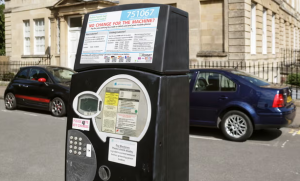Councils warn misleading codes may lead drivers to fraudulent websites where personal data is stolen

The RAC says motorists using a QR code on a parking meter should check it has not been stuck over official information. Photograph: lynchpics/Alamy
Motorists have been urged not to scan QR codes to pay for their parking after a spate of scams that take advantage of the move to mobile payments.
The RAC said drivers should be “very vigilant” and pay for their parking with cash, card or via official apps, rather than using a QR code that takes them to a website.

In recent months councils around the UK have reported that fake QR codes have been stuck on their parking signs as part of termed “quishing” scams.
The codes lead drivers to a fraudulent website where, instead of paying for their parking, the driver actually shares their payment details and information with scammers.
The RAC’s head of policy, Simon Williams, said: “Unfortunately, the increasing popularity and ease of using QR codes appears to have made drivers more vulnerable to malicious scammers. For some, this sadly means a Quick Response code could in fact be a ‘quick route’ to losing money.”
He added: “As if this quishing scam isn’t nasty enough, it can also lead to drivers being caught out twice if they don’t realise they haven’t paid for parking and end up getting a hefty fine from the council.”
Among the councils to have warned of fake QR codes are Barking and Dagenham council in east London, Northumberland and Pembrokeshire. Similar scams have also been reported at electric vehicle charging stations around the UK.
Most councils say they do not use QR codes on parking signs, and instead direct drivers towards an app for payment.
The RAC said motorists who use a QR code should first check that it has not been stuck over official information – a tell-tale sign that it has been put there later. They should also ensure the URL it takes them to carries the padlock symbol and is for the company they expected. If not, they should not input their details.
Williams added: “Many still prefer to pay with cash. Unfortunately, this option – along with payment machines – are being phased out by lots of councils, which a majority of drivers think is a bad idea.”
